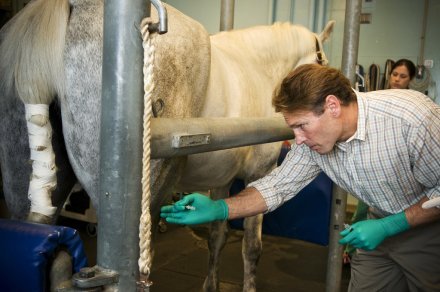Alumni in the News
We are proud of our alumni! Check out recent news articles written by or about our alumni.
- Emergency veterinarian Michael Kato '17 finds where he belongs as Assistant Professor of Emergency and Critical Care at Virginia Tech
- Dr. Sandy Willis, '84 Wins Leadership Role on AVMA Board
- Dr. Ronald Li PhD '18 Honored for Career Achievements in Feline Research
- U.S. Veterinarian Dr. Randall Singer '95 Named Winner of Medicine Stewardship Category in the WVA Global Veterinary Awards
- Dr. Kate Hurley ’99 receives 2025 AVMA Animal Welfare Award
- Dr. Doug Mader ’79, M.S. ’82, D.V.M. ’86, Residency ’88 Wins UC Davis Lifetime Achievement Award
- Dr. Michael Kotlikoff, PhD '84 Named Cornell’s 15th President
- Dr. Joan Dean Rowe, '80 Wins Small Ruminant Practitioner Award
- Alumni Named Utah's State Veterinarian, Amanda Price '06
- Veterinarian Operates on Big Gators, Doug Mader '86
- Alumnus Recognized as Top in Field, Pays Award Forward to Help Future Livestock Veterinarians, Sam Barringer '91
- Alumnus Slated to Serve as MSU Dean, Kimberly Dodd '15

Equine surgeon and professor Dr. Larry Galuppo '90, prepares to inject millions of stem cells into a 5-year old horse that suffers from joint damage as part of the stem cell therapy provided by the William R. Pritchard Veterinary Medical Teaching Hospital. - Endangered Amargosa Voles Return to Mojave Desert, Janet Foley '93
- Newborn Horses Give Clues to Autism, John Madigan '75
- To Prevent the Next Ebola, Scientists Try to Catch New Viruses Before They Break Out, Jonna Mazet '90
- Two from UC Davis Working on Front Line of Ebola Fight in Sierra Leone, Brian Bird '09 and Kim Dodd '15
- Zoo Animals and Their Discontents, Vint Varga '87
- UC Davis Veterinarian Wins National Teaching Award, Matthew Mellema '94
- Alum Serves as Picnic Day Marshal, Dick McCapes ‘58
- Academy of Sciences vet Freeland Dunker, Freeland Dunker '82
- Alum Receives Veterinarian of the Year Award, David Beltran ‘84
- Ask the Vet: Canine bloat, Kristel Weaver '06
- David Kenney, 77, first SeaWorld vet, pioneered marine mammal medicine, David Kenney '62
- Dogs May Mourn as Deeply as Humans Do, Sophia Yin, '93
- Dr. Oz: Add years to your dog's life, Jeff Werber '84
- Is it Too Late to Vaccinate my Horse?, April Knudson '03
- Major Weight Loss Tied to Microbes, Alice Liou '07
- Placerville Veterinary Clinic: For the love of animals, Rick Parsons ‘74
- Scientists Investigate Mysterious Decline Of California Sea Otters, Karen Shapiro '02, Michael Murray '81, & Melissa Miller '94
- Ventura County's first veterinarian passes baton to next leader, Craig Koerner '76
- Wellness Veterinary Services offers in-home veterinary care, Susan R Baillie '05
Did we miss someone? Contact Julia Kalika at jmkalika@ucdavis.edu
